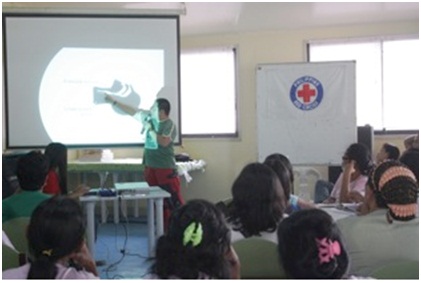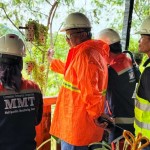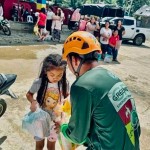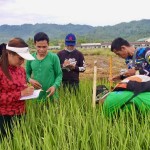Canatuan IP midwives are now more capable health care providers
Health care in these hinterlands used to be the domain of the pandoy, the traditional Subanons’ midwives. The pandoy, often revered as heroines, were the only helping hands that Subanons had in times of medical emergencies. Armed with knowledge they learned from their ancestors, these healers were the only ones available to attend to the health problems of their fellow Subanons using herbal concoctions and massage. The community depended on their pandoy to remedy ailments ranging from stomachaches to childbirths.
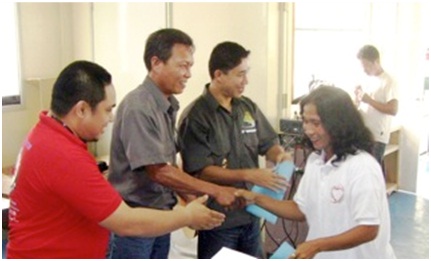
|
Top, from left, Philippine National Red Cross trainer Jan Michael de Jesus, TVIRD CReDO Manager Joel Alasco and TVIRD Senior Physician Dr. Ulysses Silorio congratulate a Subanon pandoy who completed the Basic Home Nursing Course. Below, the pandoys pose with their trainers and TVIRD personnel. These pandoy are at the centerpiece of the company’s health program that seeks to put better health care in Canatuan in the hands of Subanons.
|
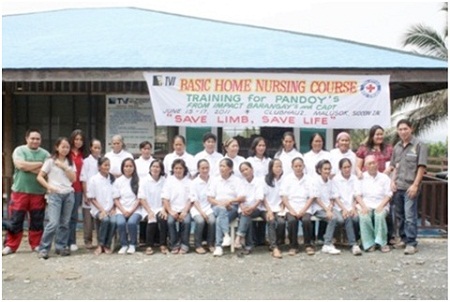
Believing that life can be better for, and that health is of paramount importance to, its Subanon hosts, TVI Resource Development (Phils.) Inc. (TVIRD), which operates a copper-zinc mine in Canatuan, launched a Basic Home Nursing Course to upgrade the knowledge of the pandoy and teach them how properly and safely to administer health care to community members. Since the company began operating in Canatuan in mid-2004, residents of the host and surrounding communities have benefited tremendously from TVIRD’s health and sanitation initiatives. But the company simply cannot handle all medical cases and, in extreme circumstances, the communities will still have to rely on the pandoy to provide succor. Thus the strategy to capacitate the pandoy.
Among the graduates of the Basic Home Nursing Course is Gloria Gumapit, 54, a pandoy from Sitio Ocho, Barangay Kilalaban in adjacent Baliguian town. “Before, I only use a sharpened bamboo strip to cut the umbilical cord of newborn babies I helped deliver. Then I would apply herbs, and sometimes ground coffee, to prevent infection. Now, I realized how wrong I was after I joined the training conducted by TVIRD,” says Gumapit, a renowned pandoy to around a hundred Subanon families in her community. She is one of the 23 pandoy who attended the latest training session sponsored by TVIRD, in cooperation with the Philippine National Red Cross (PNRC) Zamboanga del Norte Chapter.
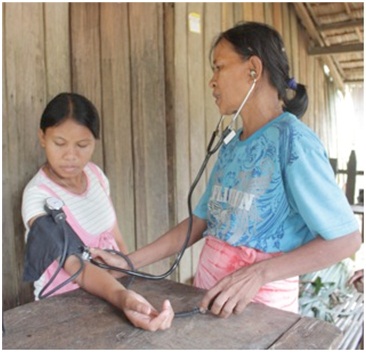
|
Above, Pandoy Gumapit checks the blood pressure of a pregnant womanin Sitio Otso, near Canatuan. Below, pandoy demonstrate proper care for newborn babies during the Basic Home Nursing Course.
|
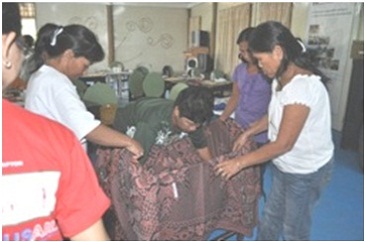
Together with a team of PNRC trainers, Dr. Ulysses Silorio, TVIRD senior physician, designed the training modules as part of the Safe Motherhood program initiated by the company to help address the lack of basic health services in far-flung areas of the Subanon ancestral domain.
Malou Prestoza, the company midwife, is the pandoy group’s mentor and organizer. “Since the pandoy were organized in March 2010, we have already conducted two training courses for them,” she says. “These are on top of the monthly health briefings we hold for them. They now know the proper way to attend to normal childbirths, to identify risks among pregnant women, to apply the right antiseptic techniques, to care for infants, to administer basic first aid, and to handle and manage emergency health-related situations at home.
“We discourage them, however, from handling maternity cases themselves anymore,” Prestoza adds. “The pandoy are now mainly tasked to monitor the health condition of mothers from time to time and submit reports to TVIRD’s Canatuan health clinic. We have a well-manned clinic and the Rural Health Unit do administer maternity cases. Nevertheless, when the situation calls for it, the pandoy are well-trained to respond the proper and safe way.”
As such, incidents of tetanus infections in babies, as well as rates of maternal and infant mortality, have dropped significantly since the pandoy training programs were held.
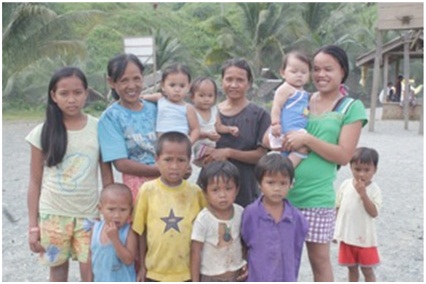
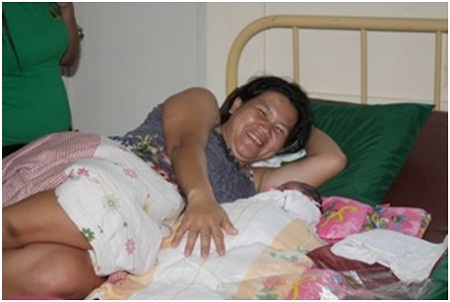
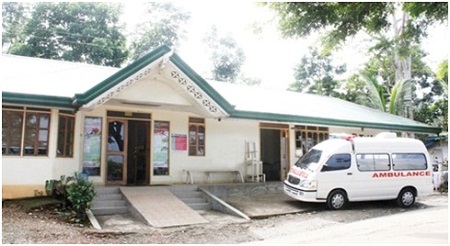
|
Top photo shows Gloria Gumapit with Sitio Otso mothers and their children whom she helped bring out into this world. In middle photo, Marites Atog, a Subanon employee of TVIRD, is all smiles after giving birth to a healthy baby at the company clinic, shown in bottom photo.
|
Gloria Gumapit is now a far better pandoy. She carries with her a “pandoy kit” where she keeps a blood pressure monitor, sanitized forceps, scissors, gloves, alcohol and other items, which she will use only during emergencies. The kit was provided free by TVIRD through its Community Relations and Development Office (CReDO) to the 23 pandoys right after they graduated from the home nursing course. She is now quite aware of the possible health complications a mother could suffer from if she does not undergo regular prenatal check up. Gumapit goes around the village to monitor the blood pressure of pregnant mothers and to provide assistance for their check-ups in the clinic.
Julma Villanueva, CReDO Junior Program Officer and in-charge of the community health program, explains that the ultimate goal of the program is for communities to continue to receive proper health care even after the end of the Canatuan mine life. “These training sessions will ensure that when that time comes, the communities still have the pandoy to serve them,” she says.
Meanwhile, Silorio has greater plans for the pandoy: “To maintain zero maternal and infant deaths, sustainable efforts should be focused on motivation through additional training programs and, possibly, the granting of honoraria for the pandoy,” he stresses.
The forthcoming training sessions will prepare the pandoy to be qualified as Barangay Health Workers or, more appropriately, “Subanon Health Workers” who will provide immediate response to health problems among their assigned households within their indigenous land. Moreover, plans are afoot for closer coordination with the local government unit in turning over the administration of these pandoy to their local barangay (village) and to the Pigbogolalan (Subanon tribal elders) even before the end of the mine’s life. This strategy is to ensure sustainability in realizing the vision of putting better health care in the hands of Subanons. (Joseph Arnel Deliverio)
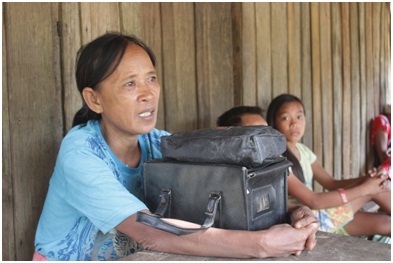
|
Above, Gumapit with her pandoy. Below, Jan Michael de Jesus of the Philippine National Red Cross, Zamboanga del Norte Chapter, stresses a point in one of the modules of the Basic Home Nursing Course.
|
